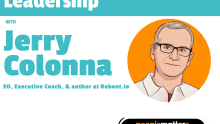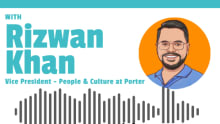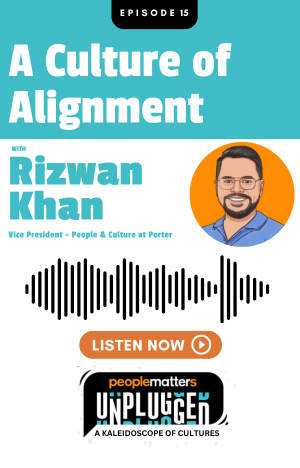Skills Gap is a very healthy sign of change: Kohler’s Global L&D Head

READ the October 2021 issue of our magazine: The Skills Gaps Conundrum
While the skills gap coexists with the talent crisis, leaders struggle through the two in order to find the right fit. Indraneel Das, Global Head Learning & Development, Kohler feels that skills gap always existed but as a hammering effect of the pandemic on the economy, the gap has broadened.
Having been a mentor for more than eight years, Das feels that skills gap always existed but as a hammering effect of the pandemic on the economy, the gap has broadened. As a leader, he has been instrumental in creating and driving leadership development and change management through an organisation-wide ‘beliefs & behaviours’ framework across 35000+ associates of Kohler around the world. His vision for his own function is to propagate a self-motivated learning culture which he fondly calls #loveforlearning.
The skills gap is widening and becoming a larger and more serious drag on business efficiency globally. What's your take on this?
Let me start by saying something - skills gap is not a new thing. It has always existed. At a very fundamental level, I look at it as a very healthy sign of change rather than a challenge. Having said that, the COVID-19 economic shock has made the skills gap broader and the need to close it more urgent. Four things are driving the skills gap, as pointed out by the World Economic Forum: evolving nature of work and work environment, technology (and its pace) and changing demographics of the workforce and ever-evolving challenges in the labour markets. However, I would like to add that there would be a lack of predictive research and subsequent efforts to skill, reskill and upskill efforts for everyone in the employment chain.
How should employers assess the skills they have within the company and the ones needed?
It’s a standard method. Always start with the end in mind. Start with organization goals (near and far-term), then go on and identify the roles needed to achieve those goals. Create and benchmark a skill inventory for each of those roles (use as much as primary and secondary data as available). Find out where your company currently stands (use a variety of assessment and collection instruments). Perform the skill gaps analysis (also in the process-identify critical employees who can be used as SMEs) and finally, address the skill gaps using the AASA framework (Awareness, Assessment, Strategy & Acceptance). Hire, reskill, upskill, repurpose accordingly.
With the continuous innovation underway, the required skills are also under continuous change. Under such a circumstance, how should companies determine the skills needed and impart those to their employees?
Let me draw a sports analogy here. Some fundamental skills that all sports people should possess are movement, control, balance, agility, power etc. These are the pre-requisites irrespective of any changes. In an organizational context, a well-done skills inventory exercise can lead us to design a core skills framework needed to be successful in your organization, much like the core competencies (defined by a typical KSA framework). Typically, dipstick these against capabilities or advantages your company has or want to have over similar companies in your field or industry. Gradually, introduce layers of new ways of working and new ways of thinking to these basic skills to enable employees succeed at the future of work.
MORE FOR YOU...
- Unilever’s Chief Learning Officer on the key to addressing the skills gap
- David Thomas of HSBC on future of learning
- Rapid-fire interview with AMD's Ruth Cotter
- New ways of working in Australia
- Interview with Dr Tomas Chamorro-Premuzic
What tools, technologies, and solutions would you want to explore to cope up with your current workforce learning challenges?
I can bucket my ‘current’ learning challenges into deeply human skills (e.g., Leadership, Purpose, Values) and digital skills (e.g., Automation, AI, Deep Learning etc.). A nimble organization focuses on both. While we can provide core skill building for both, it will be important to note that there are many ‘new age skills’ that need to be solutioned too. Models, frameworks, research, tools must be rethought keeping the current realities in mind. That’s where I feel stems the need for a better and evolved researcher-practitioner partnership. Learning from people who have different kinds of experiences rather than specialising in one aspect or industry can enable an organization to bounce ideas around and receive actionable insights (some people might call it crowdsourcing). L&D functions should make those experiences happen. Solutions would breed from there.
How can business leaders and HR teams work together to create a high-impact learning culture in their organizations?
Learning culture, like any culture, has norms and behaviours that should be practised in an environment suitable for growth. To build a true learning culture, the concept of learning should be ingrained in your employees from the moment they join your organization. Asking everyone to be an advocate for learning time, integrating learning into the flow of work, making learning social and on-demand, putting learning in individual goal sheets, rewarding learning behaviours, measuring and improving - many such steps create a true love for learning culture. Business leaders can help at the minimum by being visible ambassadors. It’s time we unleash our inner marketer and promote learning through as many willing champions as we can.
What according to you is a better solution to address the skills gap – hiring, reskilling, upskilling or renting skills?
Although my answer might border on cliché; all of these are important in various measures. Hire for skills (basis measurable assessments) instead of previous experience and you immediately have a larger and more diverse talent pool. Future proof your employees by reskilling and upskilling them for the changed world order. This is where L&D should up the ante & retool their employees (through diverse andragogy) quickly to fulfil changed business priorities. Rent out skills that are repetitive & replaceable.
Given the current scenario of the skills market and the talent crisis across the globe, do you think there could be a generic but key initiative to ‘immune’ organisations against the ‘skills gap pandemic’?
Great question! Wish there was a singular magical pill that insulated us against skill gap. Bare minimum though, companies should create a skill centric strategy that develops employees’ critical cognitive capabilities, their social and emotional skills, and their adaptability and resilience for future disruptions. Increase learning budgets and visibly commit to reskilling and upskilling to build business resilience. As we face labour market shortages around the world, how valuable it would have been to have predicted and prepared skilled talent shifting wherever needed globally and regionalizing for the benefit of the consumers.
How are addressing the skills gap conundrum at Kohler?
We are a manufacturing organization and like many, supply chain recovery and resilience is an area we are focused on too to delight our consumers around the world. Apart from buying specific talent, we are of course building innovative reskilling, upskilling and redeploying techniques to quickly upscale. Training is focused on building new-age skills like business intelligence applications like big data, value creation through smart factories, analytics to support complicated deliveries, shorter fulfilment times, increased load variety, better cost to serve. Learning is focused on creating agile, results and cost-focused, collaborative, adaptable leaders through a global Supply Chain Academy.














